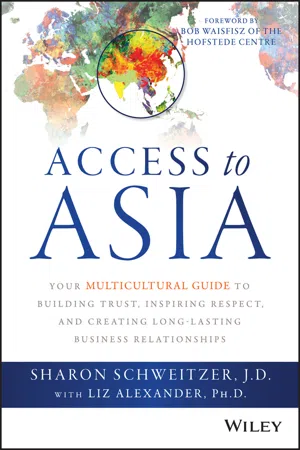
Access to Asia
Your Multicultural Guide to Building Trust, Inspiring Respect, and Creating Long-Lasting Business Relationships
- English
- ePUB (mobile friendly)
- Available on iOS & Android
Access to Asia
Your Multicultural Guide to Building Trust, Inspiring Respect, and Creating Long-Lasting Business Relationships
About this book
Create meaningful relationships that translate to better business
Access to Asia presents a deeply insightful framework for today's global business leaders and managers, whether traveling from Toronto to Taipei, Baltimore to Bangalore, or San Francisco to Shanghai. Drawing from her extensive experience and global connections, author Sharon Schweitzer suggests that irrespective of their industry, everyone is essentially in the relationship business. Within Asia, building trust and inspiring respect are vital steps in developing business relationships that transcend basic contractual obligations. Readers will find in-the-trenches advice and stories from 80 regional experts in 10 countries, including China, Hong Kong, India, Japan, and Korea.
- Discover the unique eight-question framework that provides rich interview material and insight from respected cultural experts
- Track cultural progress over time and highlight areas in need of improvement with the Self-Awareness Profile
- Learn the little-known facts, reports, and resources that help establish and strengthen Asian business relationships
Effective cross-cultural communication is mandatory for today's successful global business leaders. For companies and individuals looking to engage more successfully with their counterparts in Asia, Access to Asia showcases the critical people skills that drive global business success.
Frequently asked questions
- Essential is ideal for learners and professionals who enjoy exploring a wide range of subjects. Access the Essential Library with 800,000+ trusted titles and best-sellers across business, personal growth, and the humanities. Includes unlimited reading time and Standard Read Aloud voice.
- Complete: Perfect for advanced learners and researchers needing full, unrestricted access. Unlock 1.4M+ books across hundreds of subjects, including academic and specialized titles. The Complete Plan also includes advanced features like Premium Read Aloud and Research Assistant.
Please note we cannot support devices running on iOS 13 and Android 7 or earlier. Learn more about using the app.
Information
Chapter 1
A Question of Culture
Culture
“Culture is the accumulation of life experiences spanning generations.”Sheida Hodge, Global Smarts2
- Relationship with nature—especially the need for control
- Social structure—whether focused mostly on individuals or groups
- Appropriate goals—being or doing
- Time—past (traditions), present (current circumstances), or future (desires/goals)
- Basis of human nature—good or evil
- Conception of space—public or private
Pattern Interrupt
“(M)any Japanese executives are reserved, polite, quiet, and rarely display emotion. Somewhere there is probably a loud, boisterous, gesticulating Japanese manager who is as emotional and imperious as any prima donna. Just because we haven't met him (or her) doesn't mean that no such person exists.”Terri...
Table of contents
- Cover
- Title Page
- Advance Praise
- Copyright
- Table of Contents
- Foreword
- About the Authors
- Acknowledgments
- Introduction
- Chapter 1: A Question of Culture
- Chapter 2: Exploring Country Cultures
- Chapter 3: United States of America
- Chapter 4: Overview of Concepts and Terms
- Chapter 5: China
- Chapter 6: Hong Kong
- Chapter 7: India
- Chapter 8: Japan
- Chapter 9: Malaysia
- Chapter 10: Myanmar
- Chapter 11: The Philippines
- Chapter 12: Singapore
- Chapter 13: South Korea
- Chapter 14: Taiwan
- Chapter 15: Summary
- Bibliography
- Contributors
- Index
- End User License Agreement